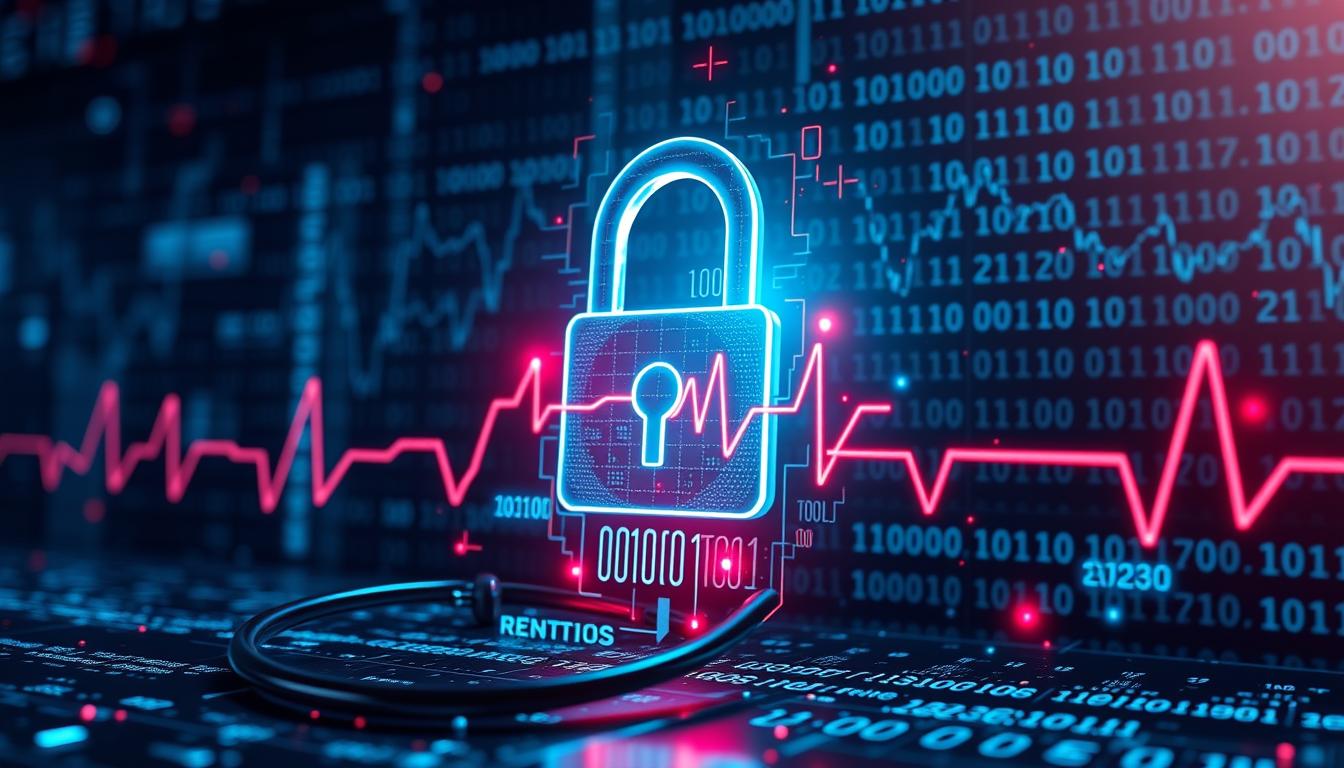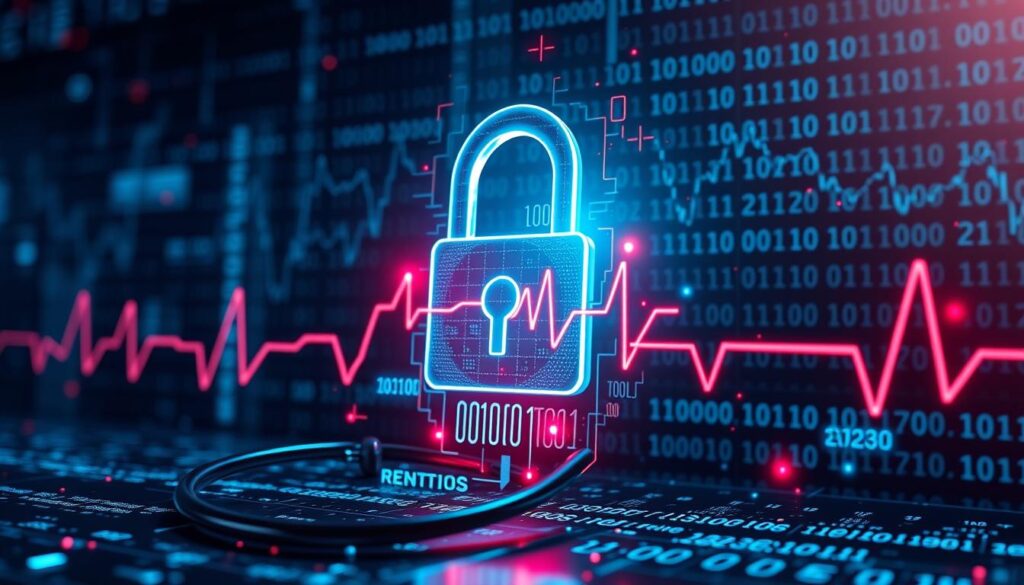Why Cybersecurity Is Important in Healthcare?

Why Cybersecurity Is Important in Healthcare
In today’s digital world, healthcare faces many cyber threats. These threats include data breaches and ransomware attacks. With more use of electronic health records, medical devices, and telemedicine, strong cybersecurity is key. But why is it so important in healthcare? What happens if we ignore this critical part of patient care?
Key Takeaways
- Healthcare data is a prime target for cybercriminals, as it contains sensitive patient information and valuable medical records.
- Cyber attacks can disrupt critical healthcare operations, jeopardizing patient safety and compromising the integrity of medical systems.
- Compliance with regulations like HIPAA is essential to avoid hefty fines and legal consequences for healthcare organizations.
- Protecting medical devices and telemedicine platforms is crucial to ensure the secure delivery of patient care.
- Comprehensive cybersecurity strategies can help healthcare organizations mitigate the growing threat of cyber-attacks and safeguard their valuable data and systems.
Introduction to Healthcare Cybersecurity
Healthcare organizations have a big job. They must keep patient data, such as medical records and personal information, safe. This data is private and key for good care. Keeping it safe is crucial, as a breach can harm patients and the healthcare provider a lot.
The healthcare sector is a top target for cyber threats. Attackers aim to disrupt medical work and risk patient lives.

The Importance of Protecting Patient Data
Patient data is vital to healthcare, and keeping it safe is key. If this data gets into the wrong hands, it can lead to identity theft and harm. Healthcare providers must keep medical data privacy strong to protect trust and their reputation.
Read More: What is Cybersecurity? Types, Threats, and Cyber Safety Tips
The Risks of Cyber Attacks in Healthcare
The healthcare field faces big risks from cyber attacks like ransomware. These attacks can shut down vital medical systems and risk patient care. They also threaten healthcare data security and electronic health records security. With more telemedicine cybersecurity challenges, the risks grow as healthcare goes digital.
Protecting patient data and healthcare systems from cyber threats is tough. Healthcare groups must be alert and use strong cloud security for healthcare to fight off ransomware attacks and other threats.
Healthcare Data Breaches: A Growing Concern
In today’s fast-paced healthcare world, keeping patient data safe is a big worry. More and more, hackers are going after healthcare groups to get patient info. This can cause identity theft, financial fraud, and the sharing of private medical info. It hurts patient trust and can really hurt the healthcare providers’ reputation and wallet.
Healthcare places are using more digital tools like electronic health records (EHRs). This puts them at more risk of healthcare data breaches. Workers who are unhappy or contractors can also be a big problem, putting patient data privacy and data privacy at risk.
Cybercriminals see healthcare as a prime target because they know how valuable the data is. Insider threats in healthcare can really hurt, making it hard for healthcare to keep running smoothly. It also makes people wonder if healthcare can keep their private info safe.
To fight the rise of healthcare data breaches, we need to do many things. This includes having strong cybersecurity, training staff, and following data privacy laws. By keeping patient data safe and watching out for new healthcare cyber threats, healthcare groups can protect their patients. They can keep their good name and keep the trust of the people they help.
Patient Data Protection: A Regulatory Requirement
In the healthcare world, keeping patient data safe is a must, not just a good idea. Healthcare groups must follow strict rules, like the Health Insurance Portability and Accountability Act (HIPAA). These rules protect patient info. Follow them to avoid big fines and penalties. This shows how important it is to have strong cybersecurity to keep patient data safe and follow the rules.
HIPAA Compliance and Cybersecurity
HIPAA is a key law that sets rules for handling protected health information (PHI). It tells healthcare providers and groups how to keep patient data safe. Following HIPAA’s cybersecurity rules is key to protecting sensitive patient info and avoiding big problems.
Penalties for Non-Compliance
- Hefty fines and penalties for HIPAA violations range from $100 to $50,000 per incident, with a maximum penalty of $1.5 million per year for each violation category.
- Potential criminal charges and imprisonment for willful neglect or intentional misuse of patient data.
- Reputational damage and loss of public trust can have a significant impact on an organization’s operations and long-term success.
Not following rules for protecting patient data in healthcare comes with big risks. This shows how important it is for healthcare groups to focus on HIPAA compliance, healthcare data security, and keeping patient info safe. It also helps in managing cybersecurity risk management challenges.
Ransomware Attacks: A Major Threat to Healthcare
Ransomware attacks are a big worry for healthcare, threatening critical medical systems and patient care. These attacks encrypt data and demand a ransom, putting healthcare providers in tough spots. They must make choices that could risk patient safety and how well they work.
Read More: What Is Ransomware? – Definition, Prevention & More
The Impact of Ransomware on Healthcare Operations
Ransomware hitting a healthcare group can be very bad. Important medical records and systems get encrypted and can’t be used. This means delays in treatment, canceled surgeries, and missing info for good care.
Healthcare has seen a rise in ransomware attacks, with many big cases lately. These attacks risk patient privacy and security. They also make it hard for healthcare workers to give timely, effective care.
- Ransomware attacks can cripple critical medical systems, leading to delays in patient care and the cancellation of scheduled procedures.
- The encryption of sensitive patient data can compromise privacy and confidentiality, exposing individuals to the risk of identity theft and other malicious activities.
- Healthcare organizations often face the difficult decision of whether to pay the ransom, which can be costly and may not guarantee the restoration of their systems.
Good ransomware protection and risk management in healthcare IT are key to fighting these ransomware attacks. Healthcare groups need strong cybersecurity, trained staff, and plans for disaster recovery. This helps keep patient care going and protects sensitive data.
Read More: Different Types of Cyber Security: A Comprehensive Guide
Medical Device Security: Safeguarding Patient Care
In today’s healthcare, medical devices, and IoT tech are key for patient care. But, they bring new security risks. It’s vital to protect these devices from cyber threats to keep patient care safe.
Devices like infusion pumps and pacemakers use software and internet connections to work well. This connection makes them more useful but also more at risk. Cybercriminals might use these devices to get into the healthcare network, steal patient info, or even harm patients.
To keep medical devices safe, healthcare groups need a strong plan. This means setting up good access controls, keeping software up to date, and teaching healthcare workers about cybersecurity. By doing this, they can keep patients safe and protect their medical systems.
Keeping patient care safe in the digital world means understanding the risks of medical devices and IoT tech. By being careful and following best security practices, healthcare groups can give top-notch care while keeping cyber threats low.
Telemedicine Security: Protecting Remote Healthcare
The COVID-19 pandemic made telemedicine more popular, letting doctors care for patients from afar. But, it also brought new cybersecurity risks. Healthcare groups now must keep their telemedicine safe and protect patient data online.
Ensuring Secure Telemedicine Platforms
To keep telemedicine safe, healthcare providers must focus on security. They need to use strong security steps, like:
- Encrypting video and audio to keep patient data safe
- Using multi-factor authentication to check who is on the other end
- Secure cloud computing for storing and sending out sensitive info
- Keeping software up to date to fix security holes
- Training staff on how to keep telemedicine safe from cyber threats
These actions help keep telemedicine services safe, private, and working well. They protect patient privacy and keep remote care quality high.
As telehealth grows, healthcare providers must always be on the lookout for new cyber risks. Keeping their telemedicine safe is key. This way, patients get the care they need, and their private data stays protected.
Electronic Health Records Security: Protecting Sensitive Data
In today’s digital world, electronic health records (EHRs) are key to healthcare. They give doctors easy access to patient info and help improve care quality. But, EHRs hold very private info, making them a big target for hackers. Healthcare groups must keep EHRs safe to protect patient privacy and follow data protection laws.
Encryption and Access Controls for EHRs
Strong encryption and access controls are key to keeping EHRs safe. Doctors should use top-notch encryption to keep patient data safe, even if there’s a breach. Also, strict access controls like multi-factor authentication and role-based access can greatly lower the risk of data theft and unauthorized access to patient records.
Cloud-based EHRs are getting more common, offering benefits like scalability and cost savings. But they also bring new security challenges. Healthcare providers must make sure their cloud providers have strong healthcare security. This ensures patient data privacy and follows laws like HIPAA.
Regular security checks, staff training, and emergency planning are vital for EHR security. By focusing on these areas, healthcare groups can keep their patients’ sensitive data safe. This helps them keep the trust of the communities they serve.
Healthcare Cybersecurity Risks: A Comprehensive Overview
Healthcare organizations face many cyber threats. These threats can harm patient data, make operations less efficient, and affect patient care. Phishing attacks and threats from inside the organization are big concerns.
Common Cyber Threats Facing Healthcare Organizations
Ransomware is a big worry for healthcare providers. It encrypts data and demands money to unlock it. These attacks can slow down medical services, delay patient care, and cause big financial losses.
Advanced persistent threats (APTs) can also be a problem. They stay in systems for a long time and can hide from detection. This can lead to the theft of sensitive data.
Insider threats come from people inside the organization who have access but use it for bad things. They might steal patient records or harm the security of the organization. It’s important to have strong rules and train employees to prevent this.
Phishing attacks are another big issue. In these, bad actors pretend to be trusted sources to get sensitive info or install malware. Employees need to be careful and well-trained to stop these attacks.
FAQ
Why is cybersecurity important in healthcare?
Cybersecurity is key in healthcare to keep patient data safe and follow the rules. It also protects critical medical systems from cyber threats. Healthcare deals with a lot of personal and medical info. If this info gets leaked, it can harm patients and healthcare providers a lot.
What are the risks of cyber attacks in healthcare?
Cyber attackers target healthcare systems more and more. This can mess up medical work and risk patients’ lives. Attacks can lead to data breaches, identity theft, and financial fraud. This can make patients lose trust and cause big financial and reputation problems for healthcare providers.
How can healthcare organizations ensure HIPAA compliance and patient data protection?
Healthcare groups must follow strict rules like HIPAA to protect patient data. Not following these rules can lead to big fines. To stay compliant and keep patient info safe, they need strong cybersecurity steps. This includes using encryption, controlling who can access data, and having good risk management plans.
What is the impact of ransomware attacks on healthcare operations?
Ransomware attacks are a big threat to healthcare, as they can shut down important medical systems. These attacks encrypt data and demand money to unlock it. This puts healthcare providers in tough spots that can risk patient safety and how well they work.
How can healthcare organizations secure medical devices and IoT technologies?
Keeping medical devices and IoT tech safe is very important. These can be weak spots for hackers to get in and mess with patient care. Healthcare groups need to take strong security measures. This includes updating software, controlling who can access it, and doing thorough risk checks.
How can healthcare providers ensure the security of telemedicine platforms?
Telemedicine has grown fast, bringing new cybersecurity challenges. To keep telemedicine safe and protect patient data, healthcare providers should use secure ways to communicate. They should also use strong checks to make sure only the right people get in and encrypt data well.
How can healthcare organizations secure electronic health records (EHRs)?
EHRs are key to modern healthcare but are also a big cybersecurity risk. Healthcare groups must use strong encryption and controls to keep EHR data safe from hackers. This means using good authentication, limiting who can see the data, and watching for any odd activity.
What are the common cyber threats facing healthcare organizations?
Healthcare faces many cyber threats like phishing, insider threats, ransomware, and complex attacks. Knowing these risks and having good plans to deal with them is key. This includes training staff, checking for weaknesses, and using strong security measures.


